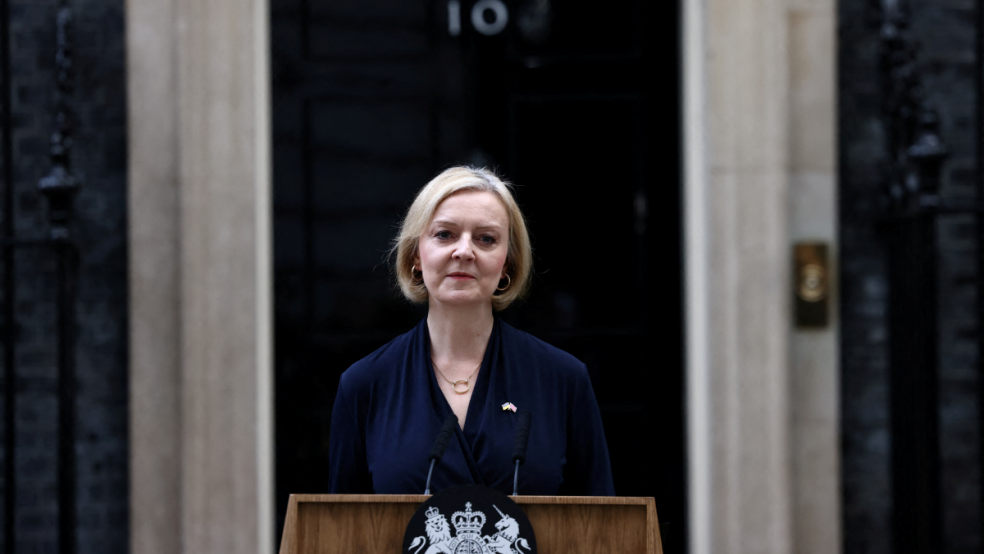British Prime Minister Liz Truss announced Thursday she would resign after just 45 days in office, the shortest tenure of any prime minister in U.K. history.
Truss’s quick downfall may carry some lessons for the U.S. It was prompted by a sharp backlash to the surprise fiscal plan her government announced last month, which proposed to slash taxes for top earners and corporations without paying for it — a full-fledged embrace of trickle-down economics that was a) politically tone deaf at a time when Britons were struggling to cope with high inflation and soaring energy bills, and b) forcefully rejected by markets, which tanked the value of the British pound and drove interest rates even higher.
Truss was forced to scrap much of her economic plan as she sought to stay in office. “I’m a fighter and not a quitter,” she told Parliament just yesterday. But the damage had been done and chaos continued to swirl around her government and her Conservative Party. Truss ultimately could not recover the confidence and credibility that had been lost, dooming her tenure to be shorter than the lifespan of a head of lettuce.
Echoes across the sea: The fiscal program laid out by Truss is a familiar one: cut taxes for the rich and wait for economic growth to take off, with the benefits eventually trickling down to the mass of ordinary citizens. It’s basically the same ideology that has animated Republican fiscal policy in the U.S. for at least four decades, and more than one conservative economist in the U.S. applauded the Truss plan.
Calling it “perfectly sensible” and “actually sound,” Michael R. Strain of the American Enterprise Institute argued that Truss’s plan to cut taxes and regulations would boost productivity, investment and growth, though he did disagree with some of the details of her approach. Larry Kudlow, who led the National Economic Council in the Trump Administration, was more straightforwardly enthusiastic and pointed to the similarity between the Truss plan and the latest Republican proposals. “The new British prime minister, Liz Truss, has laid out a terrific supply-side economic growth plan, which looks a lot like the basic thrust of Kevin McCarthy's Commitment to America plan,” he said on Fox News.
Some Truss critics, though, argue that her shambolic time in office has severely damaged the cause of supply-side economics. As Jonathan Freedland of The Guardian wrote Thursday:
“Truss may well have killed off an ideological project that has animated sections of the right, in Britain and across the democratic world, for the best part of half a century. The vision was of a low tax, low regulation society where the richest are freed to unleash their awesome talents and make themselves even richer.
“According to this vision – whether you call it Hayekism, ultra-Thatcherism, Reaganism or economic libertarianism – when the fortunate few at the top soar ever upwards, some of their wealth trickles down to those at the bottom. Versions of it have held sway at different periods in Britain, the United States and beyond.
“Now, though, such dreams will be branded as Trussonomics – and that label will be the kiss of death. In six short weeks Truss has discredited high-octane, free-market economics, perhaps for ever.”
A more sober lesson: Though the Truss debacle may provide plenty of ammunition for critics of old fashioned supply-side economics, some policymakers are taking a different lesson from the event: There are limits to fiscal planning that cannot be ignored, and those limits are imposed in large part by the global economy.
Jonathan Portes of Kings College London told The New York Times’s Mark Landler that the Truss plan simply wouldn’t work given current economic conditions. “It was the combination of the wrong fiscal policy at the wrong time — borrowing when rates were rising rather than, as in 2010s, when they were low,” Portes said.
Landler adds that Truss’s “fatal miscalculation … was to believe that Britain could defy the gravity of the markets by passing sweeping tax cuts, without corresponding spending cuts, at a time when inflation is running in double digits and interest rates were rising.”
Once the dust settles, it’s likely that Great Britain will return to a far more moderate path, though one that could still please many conservatives. “Virtually all the government’s planned tax cuts have been reversed, and the next prime minister, regardless of his or her politics, will have little choice but to pursue a policy of spending cuts and strict fiscal discipline,” Landler writes. “Some fear a return to the bleak austerity of Prime Minister David Cameron in the years after the 2008 financial crisis.”




